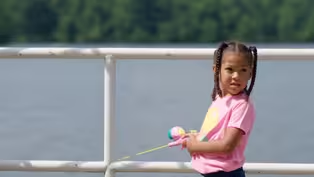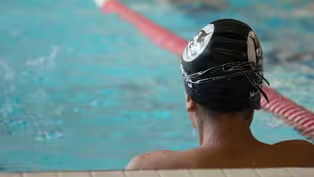
Pollywog Pond
Clip: Season 5 Episode 28 | 9m 17sVideo has Closed Captions
Pamela Watts visits Whooplah Studio’s to see the new Children’s show, Pollywog Pond, come to life.
Visit Whooplah Studio—where the new Children’s show, Pollywog Pond, comes to life. And meet the big fish in the small pond—the program’s creator, Bill Culbertson. Culbertson is both a puppeteer and video game developer. He has even been a GI Joe action figure. Learn how his artistic career took him from Disney and Sesame Street to a new address: Rhode Island PBS.
Problems playing video? | Closed Captioning Feedback
Problems playing video? | Closed Captioning Feedback
Rhode Island PBS Weekly is a local public television program presented by Ocean State Media

Pollywog Pond
Clip: Season 5 Episode 28 | 9m 17sVideo has Closed Captions
Visit Whooplah Studio—where the new Children’s show, Pollywog Pond, comes to life. And meet the big fish in the small pond—the program’s creator, Bill Culbertson. Culbertson is both a puppeteer and video game developer. He has even been a GI Joe action figure. Learn how his artistic career took him from Disney and Sesame Street to a new address: Rhode Island PBS.
Problems playing video? | Closed Captioning Feedback
How to Watch Rhode Island PBS Weekly
Rhode Island PBS Weekly is available to stream on pbs.org and the free PBS App, available on iPhone, Apple TV, Android TV, Android smartphones, Amazon Fire TV, Amazon Fire Tablet, Roku, Samsung Smart TV, and Vizio.
Providing Support for PBS.org
Learn Moreabout PBS online sponsorship(gentle music) ♪ Hello there and welcome ♪ ♪ It's great to see you drop by ♪ - We were just talking about how lucky we all are to be such good friends.
- [Narrator] This cast of characters from the new Rhode Island PBS children's show, "Pollywog Pond," spring from the imagination of Bill Culbertson.
- Just like a river going downhill.
(growls) - [Narrator] Who says he sees himself as just a big kid.
- I like to think I'm an 8-year-old, so that was a good time, a lot of things happening, and you're kind of on the border to understanding adult things, but you still want a foot back there.
- [Narrator] Culbertson's path to programming for children started as a fine arts student, earning a graduate degree in sculpture from Rhode Island School of Design.
- Just as I graduated, Hasbro was reintroducing GI Joe, the three and three quarter inch one, and they were just starting to work on those sculptures and they needed a sculptor.
I applied for the job, got hired before the end of the interview, and that's how it all started from there.
It was basically dumb luck.
- [Narrator] Not only did he begin sculpting the action figures for Rhode Island-based toy company, Hasbro, he actually became one.
His department was designing so many dolls, anew soldier in the series had to be farmed out to a freelance artist.
- Was supposed to be looking like Robert Redford.
Didn't look like him at all, so they said, "Well, we've gotta redo it," and it's money to do that, and then somebody said, "This looks like Culbertson."
So they all came around and sat behind my desk and was like, "What?
Oh God, it is.
"It looks like him.
What a waste of money."
So instead of redoing it, they just named him Wild Bill, and I became the character.
- [Narrator] Wild Bill, as the doll was named, kept Culbertson busy, as well as sculpting popular Hasbro toys, like My Little Pony.
- We did ponies, Charmkins, boy's toys, girl's toys, preschool.
I actually benefited, because I can sculpt any category.
- [Narrator] And that led to other make-believe worlds.
Culbertson decided to become a freelance artist, modeling toys for Disney and Nickelodeon.
- And I slowly built up a clientele.
I worked a lot with "Sesame Street," Jim Henson.
I learned how to do the puppet stuff, mainly with working with people at "Sesame Street."
Jim Henson would tell you how to work a puppet, it's not like this, it's you go forward, the bottom.
When we talk, our top of our head doesn't go up and down, our jaw goes up and down.
So little things like that.
- What is it about being a puppeteer that intrigues you?
- I guess just that you can make that thing come alive, and it has a personality, but you know how it's gonna react to somebody.
You know, as soon as you put the puppet on, he's automatically doing something.
And I may not even be paying attention, but he's still doing something.
- Did you ever think you'd be doing this as a career?
- No, because I always thought I had to work.
And this is not work.
- [Narrator] But it does take creativity.
Culbertson began crafting his own puppets at home, first sketching them out, and then sculpting the animals of "Pollywog Pond."
- This one's Berb, he's the big one with all the personality.
This is Derb, so they're in scale with each other.
Here's Waddle, the pink female.
- [Narrator] Culbertson transformed a spare room into his Hoopla Productions studio, and had to learn a new skill to bring his crew to life.
- I started sewing, and I didn't know how to sew, so I got my mom's old Singer sewing machine, it only goes forward and backwards.
And through trial and error, ended up learning how to sew in the seams and all that stuff.
And sort of like in the movie "Alien" where there's all those mutations and stuff, I've got lots of mutations of these until we got to the ones that were just right.
So this is the third project, and I told you it's the humanoid figure.
- [Narrator] As Culbertson was making creatures and developing his children's program, he started teaching computer generated 3D drawing at New England Tech for students learning to design video games.
- It's the human figure.
You're gonna be accentuating the muscles, exaggerating them, kinda like a Marvel superhero type of thing.
Student came up and said, "Do you wanna make a game with your characters?"
Why didn't I think of that?
So we did, and in three months, we built the basic framework of "Pollywog Pond," the video game.
As soon as the puppet starts to move, we gotta move the tree with it.
- [Narrator] "Pollywog Pond" immerses the puppets in a video game environment.
- So now the puppets, live puppets, are in the game, and it's a unique look, different than the other shows we've seen out there.
It's where it's supposed to be.
It's the world I wanted, and it's all there.
- [Narrator] As an example of how his world works, I took a dip into "Pollywog Pond."
- Hi, miss Pamela.
- Hi Derb.
It's good to see you.
Interacting with Culbertson's puppet, we said our lines in front of a green screen.
Here at the park to pick up trash.
I see you have a trash bag, too.
And after Bill edits our session, here's what the finished product looks like when the computer-generated video game background is added.
- Are you picking up litter today?
- Yes, I am.
I'm here with Berg, Waddle and Weep.
- We're a soft curriculum.
We're not doing A, B, C 1, 2, 3.
We're doing so social-emotional skills, which is critical in schools right now, especially after coming outta COVID.
Like, kids, they've missed stuff, so they need to be caught up.
- [Narrator] Culbertson hopes "Pollywog Pond" will make a big splash with preschoolers and their parents, by underscoring the message with original songs, such as this one with "The Voice" finalist, Michelle Brooks-Thompson.
♪ I'm having a perfectly awful bad day ♪ ♪ A terrible, lousy, sad day ♪ ♪ What's your name ♪ - Derb.
♪ I'd like to get to know you ♪ - [Narrator] Greg Cooney is musical director for "Pollywog Pond."
♪ Say it again ♪ - Derb!
Our themes are just like, what's happening in your daily life?
It doesn't have to be a big, complicated thing, just a simple, little thing that happens.
- You never know, you never know.
- [Narrator] Culbertson performs two of the puppets, Derb and Weep.
- Well, hello to you, too.
- [Narrator] And two other puppeteers handle Berb and Waddle.
But since Culbertson writes the scripts, he says there's a bit of him in all the characters.
- Those are all me.
It's different parts of my personality.
So when I watch the show, it's like, okay, what am I saying now?
Oh, and how am I gonna react like that?
But they're all different.
So it's like you take your personality and chop it up, and I know I'm gonna be this way and I'm gonna be this way with this character.
And the puppeteers we have are fantastic.
They have been able to just absorb the personalities of them.
And now I watch 'em, I go, "My God, it's real, it's over there.
"It's actually me, wow!"
It just blows my mind to see 'em.
- At the heart of your show, what do you want it to be for children?
- A safe place to go to, a place they trust.
I can go watch this and be interested in what they're doing, it's just like having friends, they're there, and maybe subliminally or somehow I'm learning from them.
- We knew you would make a great friend.
You had the right stuff.
You were kind, considerate, and cared about others.
- But I think that's part of what we're after, is how do you be a nice person?
Right, just be a normal, nice person in society.
- Finally tonight, we meet a man from Coventry
Video has Closed Captions
Clip: S5 Ep28 | 4m 50s | A Coventry man is getting kids outdoors by teaching thousands to fish. (4m 50s)
Video has Closed Captions
Clip: S5 Ep28 | 8m 35s | Isabella Jibilian explores the role racism has played in barring generations of swimmers from pools. (8m 35s)
Providing Support for PBS.org
Learn Moreabout PBS online sponsorship
- News and Public Affairs

Top journalists deliver compelling original analysis of the hour's headlines.

- News and Public Affairs

FRONTLINE is investigative journalism that questions, explains and changes our world.












Support for PBS provided by:
Rhode Island PBS Weekly is a local public television program presented by Ocean State Media

